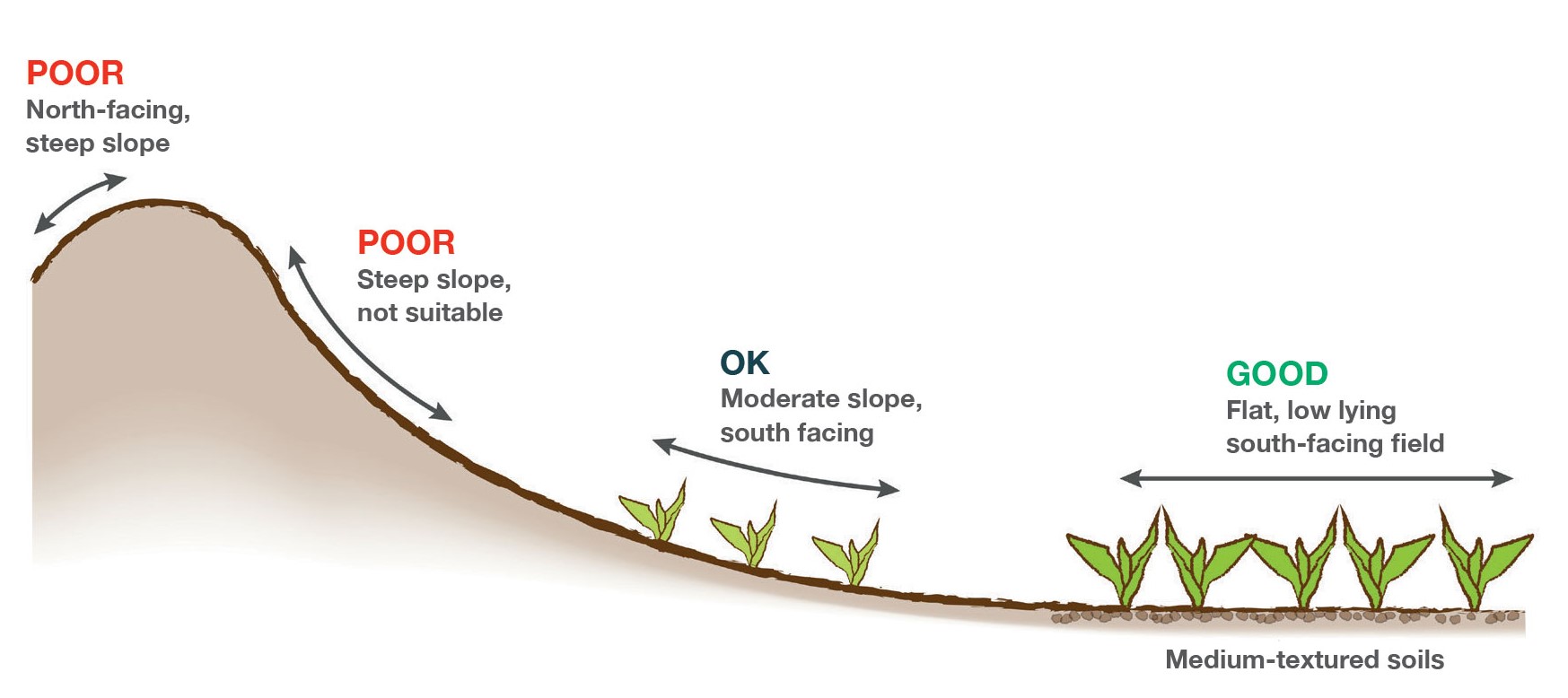- Home
- Knowledge library
- Where to grow maize
Where to grow maize
Location, soil type, altitude and field aspect should be considered before growing maize. Read about the pros and cons of growing maize under film here.
Back to: Growing maize for silage
Maize is not suitable for growing in all parts of Great Britain. Before deciding to grow maize, consider:
- Farm location
- Soil type
- Altitude
- Field aspect
Maize is a high-risk crop for soil erosion. This is because the soil is left exposed before the crop establishes, and the crop is harvested in autumn with heavy machinery, which can damage soil structure. Selecting appropriate fields is crucial to managing this risk. Also, soil and nutrient retention can be managed by:
- Choosing early maturing varieties and sowing and harvesting early, particularly on wet, unstable soils
- Choosing favourable fields
- Alleviating soil compaction before planting and post-harvest to reduce soil-water run-off and flooding
- Minimising the area of light soils exposed over winter, using cover or winter crops
- Avoiding fields next to rivers, streams, roads or buildings
- Cultivating across the slope rather than down the slope
Farm location for growing maize
A maize plant needs heat to reach maturity. Crop heat units (also known as Ontario Heat Units) are calculated with equations using maximum and minimum air temperatures. Online heat unit calculators are available to do this. Maize should not be grown in areas that receive less than 2100 heat units. Fields that achieve between 2100 and 2200 would be considered marginal. Any above 2200 are deemed suitable for maize. Most of England is suitable for growing maize for silage, with only areas in the far north and the wetter, more exposed west regarded as 'marginal'.
Maize can be grown successfully in the grey shaded areas on the map. However, special steps will be necessary, such as drilling maize under degradable film to encourage germination.
Figure 1. Suitability of ground for growing maize in GB

Figure 2. Sites for growing maize

Ideal soil type for growing maize
Maize does not do well in heavy, wet soils as they take a long time to warm up in spring, which shortens the growing season. Harvesting in autumn can also be a problem on heavier land.
Growing maize in light soils increases erosion risk. Therefore, medium-textured soils are best.
Altitude and field aspect for growing maize
Air temperature drops by approximately 1°C per 100 m (330 feet) increase in height above sea level. Forage maize will have a shorter growing season at higher altitudes, lowering its yield potential. Harvest dates will be delayed, and consequently, the risk of winter soil erosion increases.
South-facing slopes receive more heat and have a longer growing season than north-facing slopes. If planting on a north-facing slope, consider using early maturing varieties or sowing the seed under degradable film. Steep sloping fields should be avoided due to soil erosion risk.
Growing maize under film
Crops that are sown early in warm soils mature quicker than crops drilled into cooler ground. Placing plastic film over drilled maize seed creates a row cover that helps heat the soil more quickly, and so degradable film is typically used on marginal sites.
Research carried out in Ireland by Teagasc indicates that using degradable film can give a 3 t DM/ha (1.2 t DM/acre) yield advantage and a 6–10% starch advantage over sowing the crop conventionally. However, there are cost implications.
The pros and cons of growing maize under degradable film
Pros:
- Allows maize to be grown in suboptimal conditions
- Accelerates plant maturity
- Increases in starch yield are possible
- May allow an early harvest so another crop can be drilled in the same year, reducing soil loss risk over the winter
Cons:
- The variety choice is limited as it must be able to break through the degradable film as it grows
- Increased cost £300/ha (£120/acre)
- Limits weed control options
- Requires deep, stone-free soil to ensure degradable film is well buried and remains in place
Useful links
Download our guide to growing and feeding maize silage
To order a hard copy of the Growing and feeding maize for better returns manual, please contact publications@ahdb.org.uk or call 0247 799 0069.
Topics:
Sectors:
Tags:

